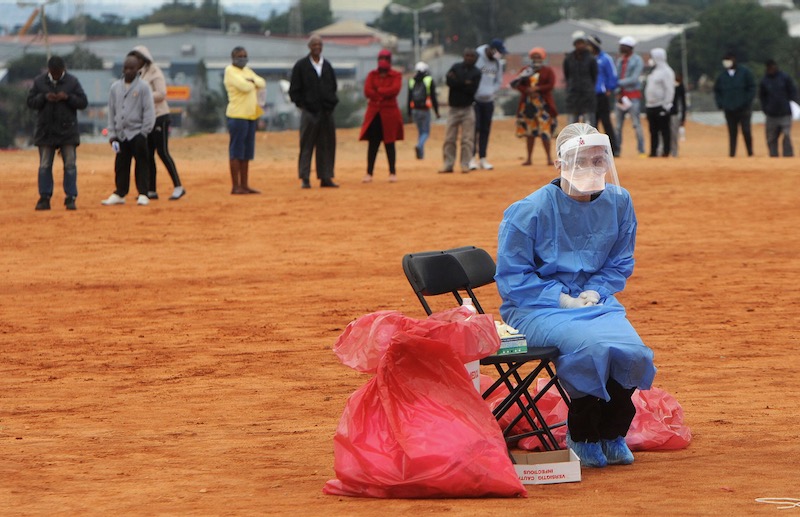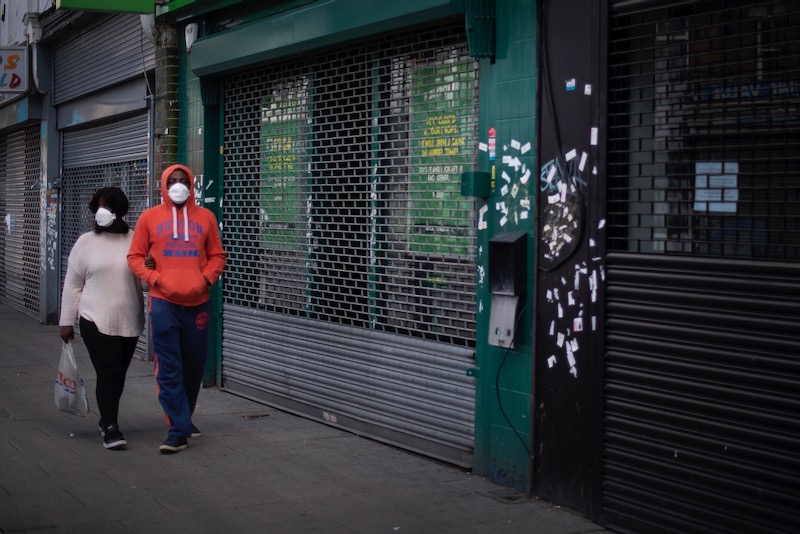The higher risk of death from coronavirus among black people and other minority ethnic groups (BAME) is an issue of racial justice and discrimination, the Church said today, and the Government must tackle the structural inequalities that have left these communities so vulnerable.
On the day that the Office for National Statistics (ONS) announced that black people are four times more likely to die from the virus than white people, with other ethnic groups facing a disproportionately high risk of death, the Bishop for Migrants said that Catholic charities and clergy had seen growing evidence that these communities were more at risk than white communities.
Bishop Paul McAleenan, the Bishop for Migrants, welcomed news that Public Health England would conduct an inquiry into the disproportionate effects of the pandemic on BAME and Gypsy, Roma and Traveller communities, and said the Church would engage with it.
“However, an inquiry alone is not enough. The Government needs urgently to tackle the known structural inequalities that have left some communities paying such a high price. We also need to recognise the disproportionate sacrifice made by people from minority backgrounds in frontline services," he said.
“This health crisis presents our society with serious questions of racial justice. Pope Francis has called on the Church to help tackle ‘intolerance, discrimination or exclusion, that seriously undermine the dignity of those involved as well as their fundamental rights, including the very right to life’. His words are especially resonant amid the challenges we face today about racial discrimination in our society.“
The ONS statistics showed that the higher rate of deaths was partly a result of socio-economic disadvantage and deprivation.
Sarah Teather, head of the Jesuit Refugee Service UK (JRS UK), said that the Government was guilty of negligence for denying services to refugees and asylum seekers, many of whom are from BAME backgrounds.
Migrants who have been granted limited leave to remain on the basis of strong family ties to the country are not allowed recourse to public funds (NRPF) in the form of state support. The JRS has called urgently for the Government to scrap this restriction, warning that it increases the risk of destitution.
Sarah Teather said today: “There is a huge amount we don’t know about why some ethnic groups are more severely affected than others. But we do know that insecure immigration status and NRPF restrictions are a barrier for accessing safe housing, a barrier to the health service and that deny many the basic essentials needed to live. Leaving so many people denied access to essential services and support when they are the very group also most likely to be impacted by the virus is an act of negligence.
“Work must continue to work to understand the risk factors underlying this stark difference in death rates between people of different ethnicities. And in the meantime, the government must act quickly to do what it can to reduce the impact on people’s lives. Now is the time for the government to grant a period of leave for all and to immediately lift NRPF restrictions.”
The High Court ruled today that the government’s policy of denying families access to the welfare safety net was unlawful after lawyers representing an eight-year-old boy, who was street homeless with his mother, told the court that the policy had left his family destitute.
“Given the large disparity in death-rates for different ethnic groups, it is critical that we do all within our power to remove obstacles we know make a difference. That is why the Jesuit Refugee Service UK and around 30 other organisations are calling on the government to grant a period of leave to remain for all with insecure immigration status and to end its use of No Access to Public Funds policies denying migrants access to services and welfare,” Ms Teather added.
This week Catholic charities told The Tablet that the Government needs to do more to protect people from BAME backgrounds.
The Head of Chaplaincy at King’s College Hospital in London, Rev Dr Alfred Banya, has asked the Catholic Association for Racial Justice (CARJ) to raise the issue with contacts in the Houses of Parliament.
Speaking in a personal capacity he said: “I understand that NHS England has written to health institutions to put in place measures to safeguard staff from BAME background who may be at increased risk, but this doesn’t seem to have been translated on the ground in institutions that I know of, except for general statements that the welfare of all staff is being catered for,” he said.
Dr Banya, a married deacon based in Southwark Archdiocese, wrote to the CARJ on 23 April after witnessing the devastating effects of the virus on patients and relatives. “We noticed being called to much younger Black and Ethnic Minorities after the first two weeks of the outbreak” he reported. “Now we hear from the press that a disproportionate number of BAME people are dying from the virus but there seems to be no urgent action to address this”.
Yogi Sutton, the CARJ Chair, warned: “It is clear from recent studies that the poor and ethnic minorities are overrepresented among those badly affected by the coronavirus and they are also over-represented among many service sector workers – health and care workers, bus drivers, couriers, postal workers, cleaners etc”.
Clifford Longley blogs on the scandal of the situation affecting BAME groups in the Covid-19 pandemic.



 Loading ...
Loading ...